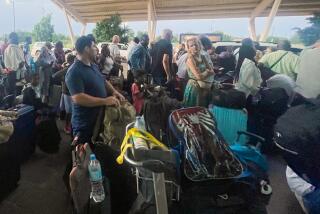Hijackers Plan More Talks, Delay Departure
- Share via
ALGIERS — The hijackers of a Kuwaiti jumbo jet agreed Sunday to postpone their departure from Algiers to give Algerian officials more time to negotiate their demands with Kuwait.
However, a tape-recorded message from one of the passengers said the 31 hostages on board the Kuwait Airways Boeing 747 would meet with a “black” end unless the Kuwaiti government met the hijackers’ demand for the release of 17 Shia Muslim terrorists imprisoned in Kuwait.
As the hijacking entered the 13th day, there were still no signs of progress in the negotiations, described by an Algerian source as being extremely “arduous.”
Indeed, the terror of the early stages of the drama has given way to an almost surreal tedium, with negotiators focusing on arrangements to clean the toilets, supply food and provide fuel for the aircraft air-conditioning system.
Another Deadline Set
As they have almost daily since the hijacking began April 5, the terrorists set another deadline for refueling, only to let it pass, met again with negotiators and put another hostage on the radio to plead with Kuwaiti authorities to accept their demands.
On Saturday, the hijackers, who are believed to be Lebanese Shia Muslims affiliated with Iran, renewed their threats to blow up the plane, killing all aboard, unless their fellow Shias in Kuwait are released.
They also demanded fuel to fly to another undisclosed destination, saying they would “settle our score with Kuwait somewhere else” because they did not want “the massacre to take place here in friendly Algeria.”
But after another mid-morning refueling deadline passed without incident, the hijackers announced Sunday that they had agreed to a request by “our brothers the Algerians” to delay their departure in order to give the negotiators another opportunity to break the deadlock with Kuwait, which has refused to consider the hijackers’ demands.
The hijackers set no new departure deadline. However, a few hours later they issued a taped message recorded by one of the Kuwaiti hostages, who identified himself as Fahmi Awad Doukhi.
“I pray to God that the government of Kuwait releases these 17 young prisoners,” Doukhi said. “If they do not, our fate will be a black one.”
An Algerian negotiator went to the plane, parked about 200 yards from the terminal at the Algiers airport, several times during the day, but authorities refused to discuss the meetings.
However, sources close to the talks indicated that the Algerian appeal to the hijackers for more time to negotiate was made at the request of Kuwait, which has asked Algeria to try to prevent the plane from taking off again.
It is not clear how much fuel the plane has left in its tanks after its four-hour flight to Algiers on Wednesday from Larnaca, Cyprus, where the terrorists murdered two of their hostages.
But earlier in the day the hijackers asked for 18 tons of fuel to run the giant aircraft’s air-conditioning unit. This is considerably more than would be needed to keep the on-board power systems running for the day, and there was speculation that the hijackers were trying to gradually build up their fuel supply for an eventual flight to another destination.
A fuel truck was hooked up to the plane in the afternoon, but it was not clear how much fuel was delivered.
Dilemma for Algerians
For the Algerians, the continuing stalemate is beginning to pose a dilemma.
Algeria enjoys a reputation as an effective mediator between moderates and radicals that goes back to its pivotal role in negotiating the release in 1981 of the 52 Americans held hostage in the U.S. Embassy in Tehran for 444 days.
That reputation has won Algeria much credit--and consequently many favors--in the Arab world. But the longer the current crisis drags on without resolution, the more likely it becomes that the Algerians will be blamed by one side or another for failing to resolve it, diplomats said.
Risk of Bloodshed
If the hijackers insist on leaving and the Algerians refuse to let them go, they will risk a repetition of the bloodshed that occurred in Cyprus, where the terrorists murdered two of their hostages.
If, on the other hand, the Algerians let the plane take off and the hijackers later carry through with their threats to blow up the aircraft, Kuwait is certain to be angered.
The situation is complicated by evidence that the hijackers may be taking their orders from Iran. Many of the hostages released before the plane landed in Algiers said that at least one of the eight hijackers boarded the aircraft during its first stop in Mashhad, Iran, where more weapons were also said to have been brought aboard.
Palestine Liberation Organization leader Yasser Arafat, whose emissaries negotiated with the terrorists in Larnaca, has openly accused Iran of masterminding the hijacking and said that several of the gunmen are members “of the Iranian government.”
More to Read
Sign up for Essential California
The most important California stories and recommendations in your inbox every morning.
You may occasionally receive promotional content from the Los Angeles Times.












